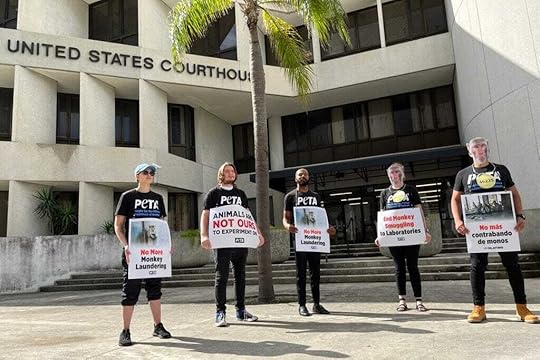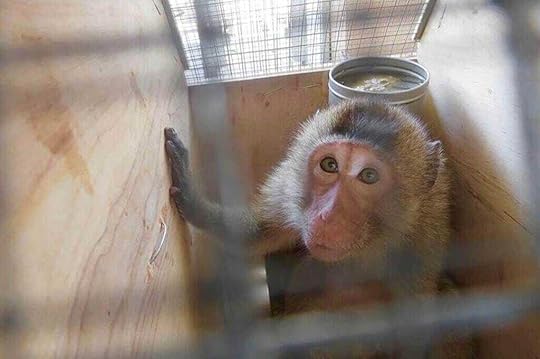Calls For US Protection for Monkeys Amid Smuggling Trial
 Photo Credit: PETA
Photo Credit: PETAThe trial of Masphal Kry, set to commence at the U.S. District Court for the Southern District of Florida on Monday, 11 March, marks a critical juncture in the fight against animal exploitation and trafficking.
With PETA supporters set to gather outside the courthouse, the case has garnered attention, highlighting the urgency of addressing the illegal trade of vulnerable primate populations.
Supporters will demand that the U.S. Fish & Wildlife Service (FWS) add vulnerable monkey populations, to the endangered species list and put an end to the primate importation pipeline.
These at-risk populations are being decimated by insatiable laboratory demand and the actions of traffickers who capitalize on it.
Background of the CaseMasphal Kry, a deputy director in the Cambodian Ministry of Agriculture, stands accused of federal monkey laundering charges.
These charges stem from a five-year investigation by the U.S. Fish & Wildlife Service (FWS) into a monkey-smuggling ring that targeted long-tailed macaques.
This particular species faces endangerment due to the decimation caused by insatiable laboratory demand.
Investigation and ArrestFollowing an investigation, Masphal Kry was apprehended on November 12, 2022, at John F. Kennedy International Airport during transit through the U.S.
Subsequently indicted by the U.S. Department of Justice (DOJ), Kry faces allegations related to the illegal trafficking of monkeys and their false identification as captive-born individuals, in violation of wildlife protection laws.
Efforts to suppress evidence by Kry’s attorneys in May 2023 revealed stark insights into the extent of the smuggling operations.
Videos filmed by a U.S. government informant in Cambodia depicted Masphal Kry orchestrating and encouraging further illicit activities, exposing the grim reality of the monkey importation pipeline.
 Photo Credit: PETAMonkey-Smuggling Ring
Photo Credit: PETAMonkey-Smuggling RingThe clandestine operations of the monkey-smuggling ring involved the abduction of long-tailed macaques from their natural habitats in Cambodia.
These endangered animals were then falsely labeled as captive-born, facilitating their illegal trade and subsequent use in laboratory experiments across the United States.
The involvement of U.S. companies in purchasing smuggled monkeys underscores the complicity of various entities in perpetuating the trade.
Since 2017, tens of thousands of long-tailed macaques have been funneled from Cambodia to buyers in the United States. These include research institutions, military facilities, and universities.
Transport ConditionsThe plight of long-tailed macaques during transportation epitomizes the cruelty inherent in the monkey-smuggling trade.
Confined to cramped crates and subjected to prolonged periods of darkness amid their own waste, these animals endure unimaginable suffering as they are transported worldwide to satisfy the demands of the research industry.
“The monkey-importation pipeline is rotten from the inside out,” says PETA Senior Vice President Kathy Guillermo.
“PETA looks forward to seeing monkey smugglers held accountable but also for U.S. experimenters, whose thirst for primates is driving this trade, to implement superior animal-free research methods.”
Trial UpdatesThroughout the trial, PETA remains committed to providing daily updates, ensuring transparency and accountability in the judicial process.
Accessible information will be available on PETA.org, enabling concerned individuals to stay informed and engaged in the pursuit of justice for the victims of animal trafficking.
Supporters RallyThe rally outside the U.S. District Court represents the collective voice of supporters demanding action to protect vulnerable primate populations.
Advocates will urge the U.S. Fish & Wildlife Service to designate long-tailed macaques as endangered and halt the primate importation pipeline, thereby safeguarding these animals from further exploitation.
Where: C. Clyde Atkins U.S. Courthouse, 301 N. Miami Ave., Miami
When: Monday, March 11, 9 a.m.
The trial of Masphal Kry serves as a key moment in the ongoing battle against animal cruelty and exploitation.
Shedding light on the grim realities of monkey smuggling and laboratory experimentation, it highlights the urgent need for legislative reforms and ethical alternatives in scientific research.
As supporters gather to demand justice, the outcome of this trial holds profound implications for the future of animal welfare.
[image error]


